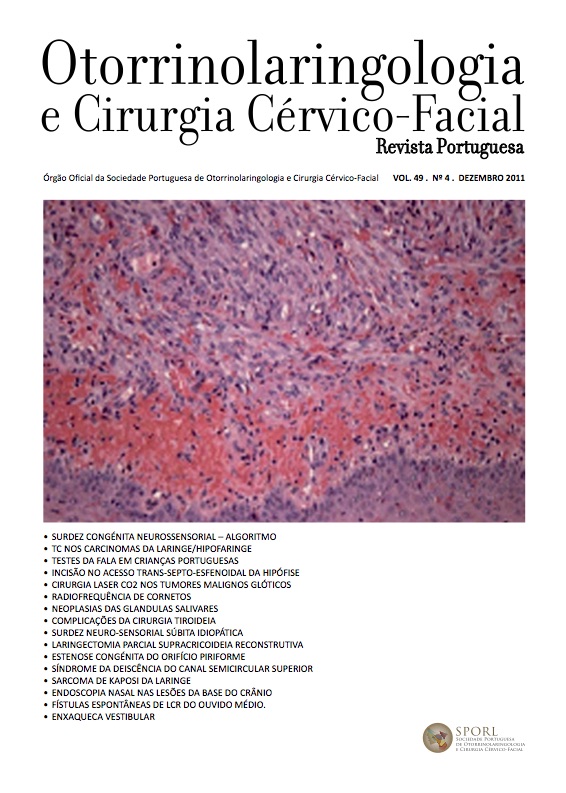Idiopathic sudden sensorineural hearing loss - Results after 3 years of therapeutic protocol implementation
DOI:
https://doi.org/10.34631/sporl.197Keywords:
hearing loss, sensorineural, sudden, idiopathic, corticosteroids, pentoxifilin, hyperbaric oxygen, valacyclovirAbstract
Introduction: The idiopathic sudden sensorineural hearing loss (ISSHL) is a clinical diagnosis, characterized by a sensorineural hearing loss of at least 30 decibel (dB) over three contiguous frequencies occurring within 72 hours. This study pretends to evaluate the results of the therapeutic protocol instituted in the ENT Department of Hospital de São Sebastião, in what concerns to hearing recovery (pure tone average in dB).
Methods and Material: Retrospective study, by clinical files analysis, of all patients with the diagnosis of ISSHL between January 2008 and December 2010 (three years), that were treated with the therapeutic protocol of Hospital de São Sebastião (Centro Hospitalar Entre o Douro e Vouga) ENT Department. Patients that were treated with outpatient treatment were excluded, which include those who presented with a clinical evolution of more than fifteen days and those that refused to be admitted for treatment. Patients were admitted in our Department to perform intravenous therapy with prednisolone, pentoxifilin and valacyclovir. Subsequent hyperbaric oxygen therapy was proposed to all patients that didn’t have a significant hearing improvement, and started, preferably, during the first week after hospital discharge.
Results: Information was collected from 11 patients, 6 male and 5 female patients, with a mean age of 51,1 years (39- 63 years). At time of diagnosis, all patients presented with homolateral tinnitus and five patients (45,5%) with vertigo complaints. The initial pure tone average (PTA), calculated as the average of thresholds at 500, 1000, 2000 and 4000 Hz, was 82 dB. Hyperbaric oxygen therapy was performed in seven patients. The rest of the patients refused this treatment. After treatment the average PTA was 50 dB (15-107,5 dB), with an average improvement of 32,6 dB (0-85 dB). There were two patients without audiometric recovery. In the group of patients that performed hyperbaric oxygen therapy, there was a significant audiometric recovery (equal or superior to 20 dB) in four patients (57%).
Conclusion: Despite the auditory improvements, the results are still insufficient, and the best treatment is still to be found. Despite the small sample and lack of statistical significance of our results, it seems to the authors that the hyperbaric oxygen therapy should be offered as a therapeutic option.
Downloads
References
Fetterman BL, Saunders JE, Luxford WM. Prognosis and Treatment of sudden sensorineural hearing loss. Am J Otol 1996; 17:529-536
Byl FM Jr. Sudden hearing loss: eight years’ experience and suggested prognostic table. Laryngoscope 1984; 94:647-661
Hughes GB, Freedman MA, Haberkamp TJ, Guay ME. Sudden sensorineural hearing loss. Otolaryngol Clin N Am 1996; 29(3):394-
Formigoni LG, Santos Junior RC, Granizo ACS, Nascimento EV, et al. Tratamento da Surdez Súbita: Experiência do Serviço de Otoneurologia
do HC FMUSP. Rev Bras Otorrinolaringol 1998; 64(4):329-334
Nakashima T, Yanagita N. Outcome of sudden deafness with and without vertigo. Laryngoscope 1993; 103:1145-1149
Shaia FT, Sheehy JL. Sudden sensori-neural hearing impairment: a report of 1,220 cases. Laryngoscope 1976; 86:389-398
Ohinata Y, Makimoto K, Kawakami M, Takahashi H. Blood viscosity and plasma viscosity in patients with sudden deafness. Acta
Otolaryngol 1994; 114(6):601-607
Cox AJ, Sargent EW. Sudden sensorineural hearing loss following nonotologic noncardiopulmonary bypass surgery. Arch Otolaryngol
Head Neck Surg 1997; 123(9):994-998
Wilson WR, Veltri RW, Laird N, Sprinkle PM. Viral and epidemiological studies of idiopathic sudden hearing loss. Otolaryngol Head Neck Surg
; 91:653-658
Wilson WR. The relationship of herpesvirus family to sudden hearing loss: a prospective clinical study and literature review.
Laryngoscope 1986; 96:870-877
Jaffer BF. Viral causes of sudden inner ear deafness. Otolaryngol Clin N Am 1978;11:63-69
Rowson KE, Hinchecliffe R. A virological and epidemiological study of patients with acute hearing loss. Lancet 1975;1:471-473
Heller U, Becker EW, Zenner HP, Berg PA. Incidence and clinical relevance of antibodies to phospholipids serotonin and ganglioside in
patients with sudden deafness and progressive inner ear hearing loss. HNO. 1998 Jun;46(6):583-6
Garcia-Berrocal JR, Vargas JA, Ramirez-Camacho RA, Gonzalez FM et al. Deficiency of naive T cells in patients with sudden deafness. Arch
Otolaryngol Head Neck Surg. 1997; 123(7):712-717
Gussen R. Sudden hearing loss associated with cochlear membrane rupture. Arch Otolaryngol 1981; 107:598-600
Mattox DE, Simmons FB. Natural history of sudden sensorineural hearing loss. Ann Otol Rhinol Laryngol 1977;86:463-480
Wilson WR, Byl FM, Laird N. The efficacy of steroids in the treatment of idiopathic sudden hearing loss: a double blind clinical
study. Arch Otolaryngol 1980;106:772-776
Parnes LS, Sun AH, Freeman DJ. Corticosteroid pharmacokinetics in the inner ear fluids: an animal study followed by clinical application.
Laryngoscope 1999; 109:1-17
Wei BPC, Mubiru S, O’Leary S. Steroids for idiopathic sensorineural hearing loss (review). The Cochrane Library 2009; Issue 4
Fattori B, Berrettini S, Casani A, Nacci A et al. Sudden hypoacusis treated with hyperbaric oxygen therapy: a controlled study. Ear Nose
Throat J. 2001; 80:655-660
Aslan I, Oysu C, Veyseller B, Baserer N. Does the addition of hyperbaric oxygen therapy to the conventional treatment modalities
influence the outcome of sudden deafness? Otolaryngol Head Neck Surg 2002; 126:121-126
Oliveira N, Neves M, Duarte D, Fernandes T et al. Oxigenoterapia hiperbárica no tratamento da surdez súbita idiopática. Rev Port ORL
; 47(4):197-202
Gianoli Gj, Li JC. Transtympanic steroids for treatment of sudden hearing loss. Otoloaryngol Head Neck Surg 2001; 125:142-146
Banerjee A, Parnes LS. Intratympanic corticosteroids for sudden idiopathic sensorineural hearing loss. Otol Neurotol 2005; 26:878-881
Ho HG, Lin HC, Shu MT, Yang CC et al. Effectiveness of intratympanic dexamethasone injection in sudden-deafness patients as salvage
treatment. Laryngoscope 2004; 114:1184-1189
Choung YH, Park K, Shin YR, Cho MJ. Intratympanic dexamethasone injection for refractory sudden sensorineural hearing loss.
Laryngoscope 2006; 116:747-752
Haynes DS, O’Malley M, Cohen S, Watford K et al. Intratympanic dexamethasone for sudden sensorineural hearing loss after failure of
systemic therapy. Laryngoscope 2007; 117:3-15






